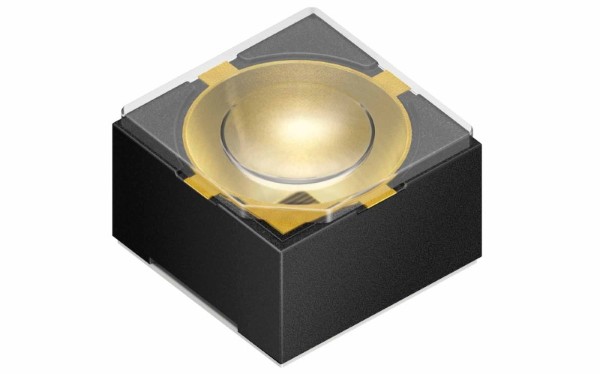Biometric identification methods are becoming increasingly popular. Biometric unlocking of cell phones and tablet computers is the principal application of the IR Oslux SFH 4780S, the first infrared emitter from Osram Opto Semiconductors with a wavelength of 810 nanometers (nm). With a height of only 2.4 mm this LED is setting new standards, achieving record radiant intensity values with a narrow emission angle from very small dimensions. This combination paves the way for compact energy-saving designs for reliable iris scanning functionality on mobile devices.
Biometric identification methods for cell phones and tablet computers are the latest trend because these devices are being used more and more for sensitive applications such as online banking and online shopping. In addition to fingerprint scans, many manufacturers are now considering iris scanning as the new biometric unlocking method. The eye is illuminated with infrared light and the camera on the device takes a picture of the iris so that its characteristic features can be identified.
 |
|
OSRAM's 810 nm LED has a height of 2.4 mm, the SFH 4780S achieve radiant intensity values of 2900 mW/sr. (OSRAM) |
The SFH 4780S from Osram Opto Semiconductors currently offers the best performance-to-size ratio. It has a wavelength of 810 nm and is the first IRED in the new high-performance Oslux package. „Oslux LEDs have long been established for visible lighting applications in mobile devices, such as camera flash. We are now extending the range to include infrared emitters,“ explained Bianka Schnabel, Marketing Manager for infrared products at Osram. Oslux components have a very narrow emission angle at a low height so they provide optimum performance. This is achieved by perfectly matching the lens to the internal reflector. A special feature of Oslux is the flat component surface despite the use of a lens.
The SFH 4780S offers extremely high radiant intensity for its compact size. Despite the low height of 2.4 mm, developers have managed to achieve an emission angle of only +- 10 degrees. As a result, the IRED achieves a record radiant intensity of typically 2900 milliwatts per steradiant (mW/sr) at an operating current of 1 amp (A). This high optical output comes from a highly efficient thin-film chip with an edge length of 750 mm in which two emission centers are arranged one above the other with the aid of Osram’s nanostack technology. The emitter can even be operated with a current of up to 2 A in pulsed mode. Thanks to its black package the SFH 4780S can be integrated completely unobtrusively behind the covers of mobile devices.
Biometric identification in mobile devices
For mobile device applications it is very important for the emitter to take as little power as possible. A wavelength of 810 nm is particularly suitable in this regard because it provides high-contrast pictures of the irises of any color at comparatively low levels of light.
The SFH 4780S is Osram's answer to the notorious problem of a lack of space in mobile devices. Whereas current designs often use several IREDs, the high radiant intensity of this new IRED enables the iris scanner to operate with only one compact emitter.
Like all applications in which the eye is exposed to infrared light, iris scanners must comply with the relevant eye safety standards. Osram supports designers with a special application note .
Technical data:
|
Dimensions |
3.5 mm x 3.5 mm x 2.4 mm |
|
Centroid wavelength |
810 nm |
|
Beam angle |
+- 10° |
|
Typical Radiant intensity |
2900 mW/sr at 1 A |












